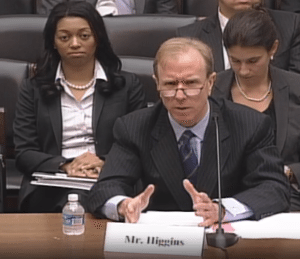Many of us are wondering when, if and how the SEC will finally roll out final regulations to implement major provisions of the JOBS Act of 2012, including Title III (investment crowdfunding) and Title IV (Regulation A+). So too were a group of Congressmen, gathered in the Halls of Congress in Washington, D.C. on July 24, 2014. The purpose of the gathering: to inquire of Keith Higgins, Chief of the Division of Corporation Finance at the SEC, as to the status of JOBS Act rulemaking.
Yes, questions were asked and answered. But by the conclusion of the hearing those assembled, and those watching via live video, knew little more than before the hearing started.
Two lines of questioning made an impression on me:
- When would final rules be implemented by the SEC, and
- Whatever becomes of the recommendations made by participants at the SEC’s Annual Forum on Government-Business Forum on Small Business Capital Formation.
 As to the “When” question, the answer was direct and clear: “we’re working on it.”
As to the “When” question, the answer was direct and clear: “we’re working on it.”
As to what happens to the recommendations made by Forum participants at the annual gathering of small business representatives, we learn “they are passed onto the Commission.”
History teaches us two things regarding the Forum: There is very little to show for small business capital formation as a result of the Forum recommendations, and there is no degree of accountability or follow-up built into the Forum program.
Alas, having stumbled across the SEC’s website seeking recommendations from the public for the upcoming 2014 Forum (SmallBusiness@sec.gov), I suppose I could simply have taken a cynical approach – suggesting  that the Forum location be moved to Punxsutawney, Pennsylvania, home of the annually celebrated Groundhog Day.
that the Forum location be moved to Punxsutawney, Pennsylvania, home of the annually celebrated Groundhog Day.
Instead, I chose to put pen to paper and provide suggestions to the SEC on how they might actually invigorate the Forum, and shape it into a more meaningful use of time, talent and resources of those concerned about improving the ability of small business to raise capital. I am unsure whether this suggestion will simply follow Punxsutawney Phil down the dark burrow he calls home, or whether this suggestion will ever cast a shadow in the light of day.
Thus, I share with you my missive to the SEC, as sent to the SEC on July 28, 2014:
______________________________
Ladies and Gentlemen,
I write to you in regards to the upcoming SEC 2014 Government-Business Forum on Small Business Capital Formation. After more than 30 years of annual Forums, mandated by federal legislation going back to 1980, perhaps this is an opportune time to consider a different approach.
A stated purpose of the Forums was set forth in the 2013 Forum Report:
“A major purpose of the Forum is to provide a platform to highlight perceived unnecessary impediments to small business capital formation and address whether they can be eliminated or reduced. Each Forum seeks to develop recommendations for government and private action to improve the environment for small business capital formation, consistent with other public policy goals, including investor protection.” [Emphasis Added]
 What appears to be missing from the Forum regimen is the absence of any type of follow-up, either between Forums, or at the next succeeding Forum. According to the Director of the Division of Corporation Finance, Keith Higgins, in response to a question posed to him in recent testimony before the House Financial Services Committee on July 24, 2014, the recommendations of the Forum participants are simply “presented to the Commission.” History shows that something more needs to be done, rather than simply passing these recommendations on to the Commission, only to resurface at the next year’s Forum, or die a quiet death.
What appears to be missing from the Forum regimen is the absence of any type of follow-up, either between Forums, or at the next succeeding Forum. According to the Director of the Division of Corporation Finance, Keith Higgins, in response to a question posed to him in recent testimony before the House Financial Services Committee on July 24, 2014, the recommendations of the Forum participants are simply “presented to the Commission.” History shows that something more needs to be done, rather than simply passing these recommendations on to the Commission, only to resurface at the next year’s Forum, or die a quiet death.
Equally absent is the sense of any accountability, or urgency, on the part of the Staff of the Commission, with regard to the recommendations of the Forum participants. Again, in recent testimony by Mr. Higgins, he remarked that none of the Forum recommendations were given a “high” priority by the Forum participants – instead all of the recommendations were rated as either “medium” or “low” priority. Indeed, if achieving a “high” priority is a quid pro quo to follow-up action by the Staff, this explains why most of the scores of recommendations made by Forum participants over the past 30 years never saw the light of day at the SEC following the conclusion of the Forum. Indeed, based upon the quantitative rating scale utilized by the Staff to assess “priority,” it is safe to say that will be a rare day indeed when any recommendation, regardless of importance, achieves the benchmark of a “high” priority. Indeed, the rating scale appears to do little more than to provide “cover” to SEC officials, when asked to account to those outside  the Commission as to why Forum recommendations have not been acted upon, let alone further considered at the conclusion of each Forum
the Commission as to why Forum recommendations have not been acted upon, let alone further considered at the conclusion of each Forum
In sum, Mr. Higgins’ recent remarks suggest that the Staff of the Commission, at best, simply passes the buck to the Commission following the conclusion of each year’s Small Business Capital Formation Forums. Given both the importance of capital formation for small business, the role of the SEC in facilitating capital formation, and the time, energy and resources expended by the Forum participants, perhaps it is time for the Commission to consider some element of “follow-up”, and accountability, by the Commission, both as part of succeeding Forums, and during the 364 days in between each Forum.
There are myriad ways the Commission could implement some element of “follow-up” or accountability. Given that this involves, in the first instance, the internal processes of the Commission, it seems that proposals for how this could be incorporated into the Small Business Forum regiment ought to be initiated by the Staff itself. By way of example, perhaps it ought to fall to the Office of Small Business Policy to take the leading oar on recommendations following the conclusion of each year’s Forum. Perhaps a component of each year’s Forum ought to include a “State of Small Business Capital Formation,” whereby the Commission and/or the Staff advises the Forum on what has been achieved for Small Business as a result of the prior year’s Forum and respond to questions by participants as to prior year(s) recommendations.
By way of example only, the 2012 Forum had particular significance, coming on the heels of the passage of the “JOBS Act of 2012.” The November 2012 Forum had as its Number One recommendation:
Required disclosure for crowdfunding issuers should be simple and allow for standardization, and take into account the size and stage of development of the issuer (including, specifically, whether the issuer is a start-up). [222 points; avg. ranking 3.89]
This recommendation did not get very far, judging by outward appearances. The Commission’s Proposed Rules implementing Title III of the JOBS Act dismissed this recommendation in its entirety, instead stating that third party service providers could aid small businesses in the disclosure process. And less than two months later, when the Commission proposed its Title IV rules (Regulation A+), it proposed to entirely eliminate the optional standardized Question and Answer format adopted from the apparently successful model in state registered small business “SCOR” offerings as a result of the joint collaboration between The North American State Securities Administrators Association (NASAA) and the American Bar Association.
 In sum, if history is to be any guide, for decades the Commission has squandered valuable time, resources and, most importantly, ideas, of the scores of Forum participants who convene every year at the Commission’s Headquarters to take part in the Government-Business Forum on Small Business Capital Formation. The time has come for the Commission to develop some degree of self-accountability and transparency, in the context of the annual Small Business Capital Formation Forum. Then, and only then, will a representative of the Commission be able to address members of Congress in a meaningful way, when asked: What happens to the Small Business Capital Formation Forum recommendations?
In sum, if history is to be any guide, for decades the Commission has squandered valuable time, resources and, most importantly, ideas, of the scores of Forum participants who convene every year at the Commission’s Headquarters to take part in the Government-Business Forum on Small Business Capital Formation. The time has come for the Commission to develop some degree of self-accountability and transparency, in the context of the annual Small Business Capital Formation Forum. Then, and only then, will a representative of the Commission be able to address members of Congress in a meaningful way, when asked: What happens to the Small Business Capital Formation Forum recommendations?
Until then, the annual Small Business Forum will be more akin to Ground Hog Day – albeit with small business never seeing its shadow.
I would be pleased to discuss this further with the Staff when, as and if it is so inclined.
Respectfully submitted,
Sam Guzik
_____________________
 Samuel S. Guzik, a recognized authority on the JOBS Act including Regulation D private placements, investment crowdfunding and Regulation A+, writes a regular column, The Crowdfunding Counselor, for Crowdfund Insider. A consultant on matters relating to the JOBS Act, he recently led a Crowdfunding Roundtable in Washington, DC sponsored by the U.S. Small Business Administration Office of Advocacy. He is a corporate and securities attorney and business advisor with the law firm of Guzik & Associates, with more than 30 years of experience. He is admitted to practice before the SEC and in New York and California. Guzik has represented a number of public and privately held businesses, from startup to exit, concentrating in financing startups and emerging growth companies. He also frequent blogger on securities and corporate law issues at The Corporate Securities Lawyer Blog.
Samuel S. Guzik, a recognized authority on the JOBS Act including Regulation D private placements, investment crowdfunding and Regulation A+, writes a regular column, The Crowdfunding Counselor, for Crowdfund Insider. A consultant on matters relating to the JOBS Act, he recently led a Crowdfunding Roundtable in Washington, DC sponsored by the U.S. Small Business Administration Office of Advocacy. He is a corporate and securities attorney and business advisor with the law firm of Guzik & Associates, with more than 30 years of experience. He is admitted to practice before the SEC and in New York and California. Guzik has represented a number of public and privately held businesses, from startup to exit, concentrating in financing startups and emerging growth companies. He also frequent blogger on securities and corporate law issues at The Corporate Securities Lawyer Blog.


